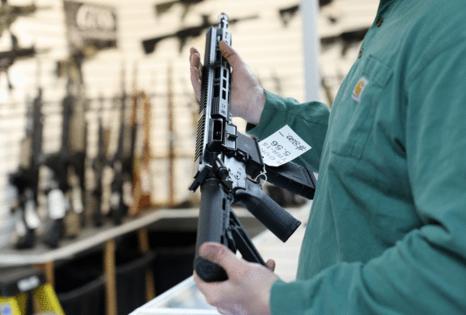Trump's Department of Justice allowed to argue against Illinois assault weapons ban case this month
Published in News & Features
President Donald Trump’s Department of Justice has been allowed to insert itself into a federal appellate court case over Illinois’ ban on certain high-powered guns and high-capacity magazines, with the administration arguing it is seeking to protect citizens’ Second Amendment rights.
The Trump administration isn’t a party to the case, but the 7th U.S. Circuit Court of Appeals in Chicago has allowed the Justice Department’s top official in charge of civil rights, Harmeet Dhillon, to deliver oral arguments for five minutes when the panel hears arguments later this month over whether the 2023 law violates the U.S. Constitution.
It’s the latest effort by the Trump administration to poke Gov. JB Pritzker, a consistent Trump foe and potential 2028 White House aspirant, with Trump and Pritzker most recently waging a war of words over the federal government amping up its immigration enforcement efforts and potentially deploying National Guard troops to Chicago streets.
Trump’s DOJ has also sued over a Pritzker policy allowing immigrants without legal status to pay lower college tuition rates. In addition, Dhillon herself has led the Justice Department’s efforts to get the Illinois State Board of Elections to turn over sensitive data about the state’s roughly 8.3 million voters as part of a broader effort by the Trump administration to exert power over state-run elections, data that state elections officials have not handed over.
In the gun case, the Department of Justice is siding with gun-rights groups to oppose a Pritzker-backed law that was passed following the mass shooting at the 2022 Highland Park Fourth of July parade that left seven dead and dozens injured.
The state’s gun ban prohibits the delivery, sale, import and purchase of more than 100 high-powered guns, including semiautomatic rifles, shotguns and handguns. It also requires anyone owning a prohibited weapon prior to when Pritzker signed it into law in January 2023 to register it with the Illinois State Police.
In June, the Justice Department filed a brief to support the gun rights groups, including the Illinois State Rifle Association, and their arguments that the guns subject to the Illinois ban fall under Second Amendment protections. The brief noted how Trump has instructed his administration to protect those rights as his handpicked attorney general, Pam Bondi, has instructed the Justice Department “to use its full might” in protecting Americans’ right to bear arms.
Oral arguments are scheduled for Sept. 22 with legal teams representing the gun rights groups and Illinois Attorney General Kwame Raoul’s office each being allowed over 40 minutes to present their positions, compared with five minutes for Dhillon, a Republican stalwart who has been a Fox News personality and was once the vice chair of the California GOP.
Trump’s interest in the gun ban case also signals his assurances to gun rights groups that he supports their constitutional right to bear arms.
“This case poses important questions about the scope of the Second Amendment’s protections. The United States has strong interests in ensuring that these important questions are correctly resolved; that the Second Amendment is not treated as a second-class right; and that law-abiding Americans in this Circuit are not deprived of the full opportunity to enjoy the exercise of their Second Amendment rights,” the Justice Department wrote.
At issue between the gun rights groups and Raoul’s office was whether the gun ban follows a new constitutional standard requiring firearm measures to be “historically” consistent with laws on the books in the 18th century or earlier. This was established by the landmark 2022 U.S. Supreme Court ruling in New York State Rifle & Pistol Association v. Bruen.
Proponents of the gun ban have argued it’s constitutionally sound, saying there are firearms subject to the ban akin to military-use weapons, which are not meant to be used by average people for self-defense. Gun rights groups, however, have contended the ban is unconstitutional because there’s a historical tradition of gun laws in the U.S. that allow such weapons in common use — such as ones subject to the Illinois prohibition, including AR-15 rifles — to be owned by private law-abiding citizens.
“The AR-15 is in common use by law-abiding citizens for lawful purposes, including for self-defense, target shooting, and public defense,” the Justice Department said in a June filing. “Once an arm is in common use, its mere possession cannot ‘be infringed or forbidden by the Legislature.'”
Last year, the U.S. Supreme Court declined to take up an appeal related to the gun ban from the gun rights advocates, noting the legal challenge at the time was only in the preliminary injunction phase. But Justice Clarence Thomas, a member of the high court’s six-member conservative majority, said the court should take up the full case if it comes back for review. He also expressed deep reservations about the Illinois gun ban’s constitutionality.
The full case currently sits with the 7th Circuit. If the panel upholds the constitutionality of the gun ban, firearms advocates could make another push for the case to be considered by the high court.
_____
©2025 Chicago Tribune. Visit chicagotribune.com. Distributed by Tribune Content Agency, LLC.







Comments